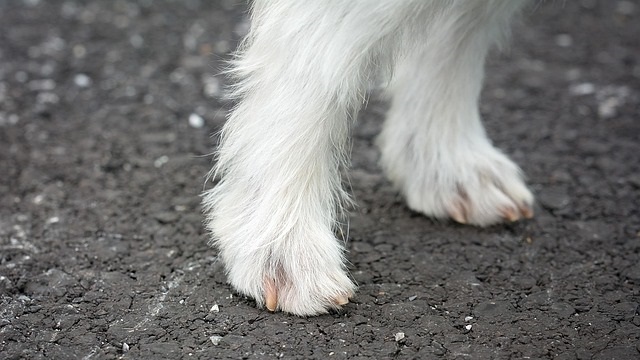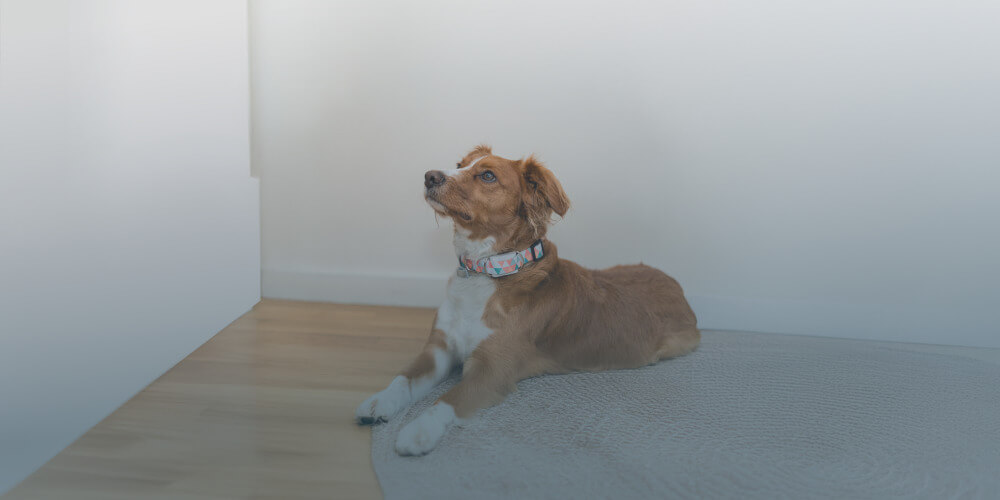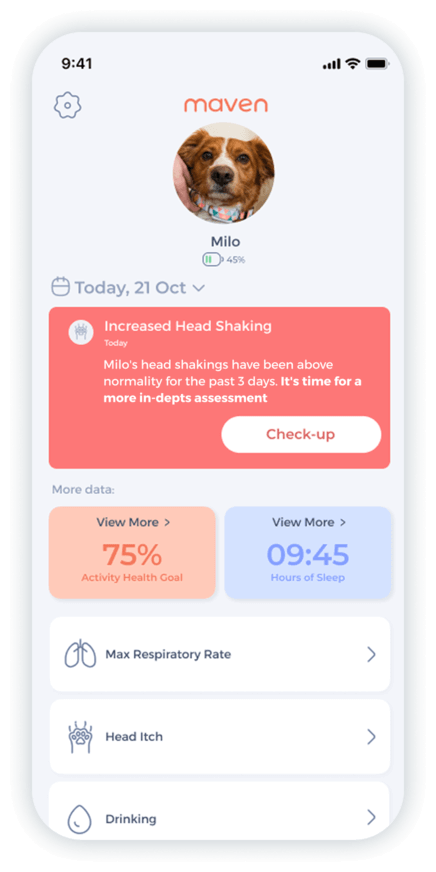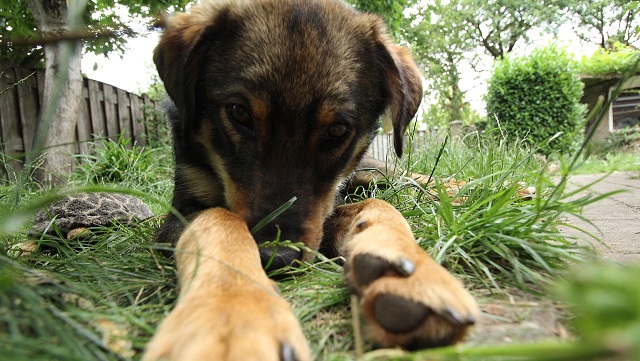Why Is My Dog Chewing Her Feet? Causes and Relief Tips (Vet Verified)
If you’ve been asking yourself why is my dog chewing her feet, know that we’ve all been there. Now, dogs may gnaw at their paws simply because they are bored. At other times, it may be parasites, injuries, or other underlying issues that require immediate veterinary care. This guide is designed to give you the answer to the million-dollar question and some tips on how to give your pup some relief.
Key takeaways:
- Dogs chew their feet due to itchiness, pain, stress, or boredom
- Allergies, parasites, injuries, infections, and dry skin are common causes
- Constant chewing often points to chronic issues that need veterinary care
- Redness, swelling, odor, or bleeding paws are warning signs of medical concern
- Pet health trackers like Maven help spot changes early and guide timely treatment
Why Is My Dog Chewing Her Feet?
Dogs usually chew their feet because something is bothering them. It could be itchiness, pain, or just plain boredom. Allergies are often the main suspect, as they can cause paws to become extremely itchy. Parasites, such as fleas or mites, can have the same effect. On the other hand, a cut can make the dog chew its paw. Paws are soft, and cuts and tiny splinters that always find a way there bug pups tremendously. Like an itch you can’t scratch, especially when those cuts start to heal.
Common Causes of Foot Chewing

There are several issues that can trigger a seemingly nasty habit in dogs. Here are the most common ones to watch for:
- Allergies: Pollen, dust, or grass, as well as something the dog ate that didn’t agree with it, can leave its paws itchy and feel like they are on fire, causing excessive chewing of its paws and feet.
- Parasites: It’s fleas, mites, and ticks that are dogs’ natural enemies, not cats. These parasites irritate the skin, causing your dog to chew or lick in an attempt to find relief.
- Injuries: Injuries sustained from splinters, minor cuts, and even overgrown nails can cause discomfort that leads to excessive chewing.
- Dry skin: In winter, paw pads usually become dry, which can make them prone to cracking, and that can easily lead to your pooch chewing the lights out of its paws.
- Boredom or stress: Dogs are known for chewing their paws as a self-soothing behavior when they’re anxious or under-stimulated. Keep them busy, and it should stop.
Since the causes range from harmless to more serious, it’s essential to pay attention to patterns. The easiest way to do it is by using a pet health tracker. The data from them can let you know when chewing has become too frequent, intense, or when it’s paired with other symptoms. Then, you’ll know it’s time for a vet check.
“I got the Maven sensor for my 14-year-old Chihuahua mix with heart and trachea issues. It gave me back peace of mind – I can track her RRR, BPM, drinking, and activity anytime and know instantly if something’s wrong. Highly recommend!”

★★★★★
Chiara De Luca
Titti
Why Is My Dog Chewing on Her Feet Constantly?
If your dog is chewing on her feet nonstop, it usually means there’s an underlying issue. Boredom is not that. This kind of behaviour is often linked to chronic allergies, ongoing skin infections, or stubborn parasites that keep irritating the skin. In some cases, it can also be a sign of pain or a different medical issue. For example, arthritis can cause the joints and limbs to swell and hurt, which, in turn, can make the dog lick and chew its feet and paws more.
When Chewing Becomes a Medical Concern

When chewing has become more than just an occasional nibble and you start seeing other symptoms, it’s time to call the vet. These symptoms include:
- Red, swollen, or bleeding paws
- Persistent limping or favoring one paw
- Foul odor coming from the feet
- Pus, discharge, or crusty skin between the toes
- Constant licking or chewing that doesn’t stop, even with a distraction
- Hair loss or bald spots around the paws
- Signs of pain when you touch the feet
Catching the issue early can prevent it from developing into something much more difficult to treat.
Relief Options and Treatment
The relief options and treatment depend on the cause of the excessive chewing.
- For allergy management: For allergies, vets usually prescribe antihistamines, steroids, or other medications to alleviate itching.
- For parasite control: Here, we are talking about prescription flea, tick, and mite preventatives or deworming medications.
- For treating infections: For bacterial infections, dogs typically receive antibiotics.
- For treating injuries, take care of the wounds, check their paws regularly, and apply a bandage.
- Treating dry skin: Topical ointments or medicated shampoos should do the trick here.
- For pain relief: Pain medications can help if the chewing is linked to conditions like arthritis.
“Occasional paw chewing can be normal, but frequent or obsessive chewing usually signals discomfort — from allergies to infections. The sooner we identify the cause, the faster your dog can find relief.” – Dr. Joana Babo, DVM at Maven Pet
How the Maven Pet Health Monitor Helps Track Behavior and Health Changes
By the time you notice sore spots from excessive chewing, your dog may have been uncomfortable for weeks. Maven Pet’s dog health tracker helps you stay ahead by tracking daily activity, rest, and behavior patterns. If your dog starts chewing or licking her paws more than usual, Maven compares it to her baseline and highlights the change early on.


Monitor heart rate, respiratory rate, activity & rest, drinking, itch behavior.
The system also monitors things like respiratory rate, restlessness, and unusual behaviors, and it can point to whether the chewing is stress-related, pain-driven, or tied to another health concern. With real-time alerts and a detailed activity log in the app, you can bring your vet concrete data, making it easier to connect the chewing habit to a potential underlying cause.
Conclusion
Constant or intense chewing can signal allergies, infections, parasites, or even pain that your dog may be experiencing daily. If it’s an occasional bite, you’ve got nothing to worry about. If it’s the former, you need to start paying attention to patterns, watching for warning signs, and seeking veterinary care early so that you can spare your dog unnecessary discomfort. Tools like the Maven Pet Health Monitor make it easier to spot changes before they become serious.
Maven Pet focuses on improving the quality of life of our pets with technology, using artificial intelligence (AI) to enable proactive pet care. By accurately collecting and monitoring pet data 24/7 and flagging any irregularities, Maven Pet empowers pet parents and veterinarians to stay ahead of potential health issues, ensuring the well-being and longevity of our beloved companions.




